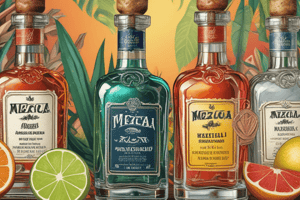Podcast
Questions and Answers
¿Por qué algunos palenqueros combinan agaves de diferentes precios?
¿Por qué algunos palenqueros combinan agaves de diferentes precios?
- Para crear un sabor único
- Para aumentar la cantidad de producción
- Para crear un aroma específico
- Para reducir el costo total de producción (correct)
¿Qué se entiende por 'mezcla' en la producción de mezcal?
¿Qué se entiende por 'mezcla' en la producción de mezcal?
- Una combinación de agaves de diferentes variedades (correct)
- Una combinación de diferentes ingredientes
- Una mezcla de sabores y aromas
- Una mezcla de aguas destiladas
¿Cuál es la diferencia clave entre una mezcla y un ensamble?
¿Cuál es la diferencia clave entre una mezcla y un ensamble?
- El sabor final
- El proceso de destilación (correct)
- La cantidad de agave utilizada
- El tipo de agave utilizado
¿Por qué es importante entender el papel de las mezclas en la producción de mezcal?
¿Por qué es importante entender el papel de las mezclas en la producción de mezcal?
¿Cuál es el propósito de crear un ensamble de mezcal?
¿Cuál es el propósito de crear un ensamble de mezcal?
¿Qué es un blend en el contexto de la producción de mezcal?
¿Qué es un blend en el contexto de la producción de mezcal?
¿Cuál es el objetivo principal de los palenqueros al mezclar diferentes agave varietales?
¿Cuál es el objetivo principal de los palenqueros al mezclar diferentes agave varietales?
¿Por qué los palenqueros a menudo utilizaban diferentes agave varietales en la producción de mezcal?
¿Por qué los palenqueros a menudo utilizaban diferentes agave varietales en la producción de mezcal?
¿Cuál es un beneficio práctico de mezclar agave varietales con diferentes niveles de contenido de azúcar?
¿Cuál es un beneficio práctico de mezclar agave varietales con diferentes niveles de contenido de azúcar?
¿Cómo se llamaba originalmente al mezcal producido con cualquier agave disponible?
¿Cómo se llamaba originalmente al mezcal producido con cualquier agave disponible?
¿Por qué los palenqueros creaban mezclas de agave varietales?
¿Por qué los palenqueros creaban mezclas de agave varietales?
¿Qué influencia la práctica de crear mezclas de agave varietales?
¿Qué influencia la práctica de crear mezclas de agave varietales?
Flashcards are hidden until you start studying
Study Notes
Mezcal, a traditional Mexican spirit distilled from various types of agave plants, has a rich history and diverse production methods. One of the key aspects of mezcal production is the creation of mezclas, or blends of different agave varietals. This practice is rooted in the artisanal nature of mezcal production and is influenced by both tradition and practicality.
The Tradition of Mezclas
Mezclas have been a part of mezcal production for centuries. Originally, mezcal was produced with whatever agave was available to the palenqueros, who were often located in rural areas far from the city of Oaxaca. This led to a variety of agave species being used, and the resulting mezcal would be called simply "mezcal".
However, the palenqueros also experimented with blending different agave varietals to create specific flavors. This was done based on the palenquero's personal preference for the taste, rather than considering factors such as nose or finish. The objective was to fill as many fermentation vats as possible, and sometimes, excess agave from different varietals would be combined into a vat, resulting in a particular mezcla.
Practical Reasons for Mezclas
There are several practical reasons why palenqueros might create mezclas. For instance, if one agave varietal has a low sugar content and another has a high sugar content, combining the two might result in a higher yield of the final mezcal. Additionally, some palenqueras are sensitive to the cost of producing mezcal based on the typical yield of different agave varietals. In some cases, combining less expensive agave with more expensive varieties can reduce the overall cost while retaining much of the flavor.
Differentiation from Ensembles and Blends
While the term "mezcla" often refers to a blend of different agave varietals in the context of mezcal production, it is not the same as an "ensemble" or a "blend." An ensemble refers to a combination of mezcal distillates that are separately distilled but then blended together, often to create a specific flavor profile. A blend, on the other hand, refers to a mixture of mezcal distillates with other ingredients, such as fruit or spices, to create a unique flavor experience.
Conclusion
Mezclas, or blends of different agave varietals, have been a part of mezcal production for centuries. They are rooted in both tradition and practicality, with palenqueros experimenting with different combinations to create unique flavors and maximize yield. While the term "mezcla" is often used to describe these blends, it is distinct from ensembles and blends, which involve different distillation processes and ingredient combinations. Understanding the role of mezclas in mezcal production provides valuable insight into the artisanal nature and complexity of this traditional Mexican spirit.
Studying That Suits You
Use AI to generate personalized quizzes and flashcards to suit your learning preferences.




